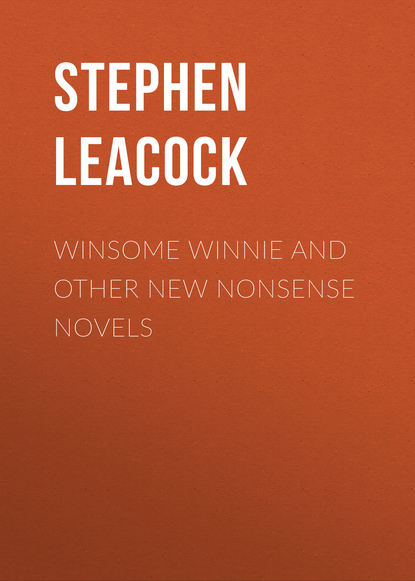По всем вопросам обращайтесь на: info@litportal.ru
(©) 2003-2025.
✖
Winsome Winnie and other New Nonsense Novels
Автор
Год написания книги
2019
Настройки чтения
Размер шрифта
Высота строк
Поля
"Miss Croydon," I said, "I am now about to ascertain our longitude. To do this I must lower myself down into the sea. Pray do not be alarmed or anxious. I shall soon be back."
With the help of a long line I lowered myself deep down into the sea until I was enabled to ascertain, approximately at any rate, our longitude. A fierce thrill went through me at the thought that this longitude was our longitude, hers and mine. On the way up, hand over hand, I observed a long shark looking at me. Realizing that the fellow if voracious might prove dangerous, I lost but little time—indeed, I may say I lost absolutely no time—in coming up the rope.
The girl was waiting for me.
"Oh, I am so glad you have come back," she exclaimed, clasping her hands.
"It was nothing," I said, wiping the water from my ears, and speaking as melodiously as I could.
"Have you found our whereabouts?" she asked.
"Yes," I answered. "Our latitude is normal, but our longitude is, I fear, at least three degrees out of the plumb. I am afraid, Miss Croyden," I added, speaking as mournfully as I knew how, "that you must reconcile your mind to spending a few days with me on this raft."
"Is it as bad as that?" she murmured, her eyes upon the sea.
In the long day that followed, I busied myself as much as I could with my work upon the raft, so as to leave the girl as far as possible to herself. It was, so I argued, absolutely necessary to let her feel that she was safe in my keeping. Otherwise she might jump off the raft and I should lose her.
I sorted out my various cans and tins, tested the oil in my chronometer, arranged in neat order my various ropes and apparatus, and got my frying-pan into readiness for any emergency. Of food we had for the present no lack.
With the approach of night I realized that it was necessary to make arrangements for the girl's comfort. With the aid of a couple of upright poles I stretched a grey blanket across the raft so as to make a complete partition.
"Miss Croyden," I said, "this end of the raft is yours. Here you may sleep in peace."
"How kind you are," the girl murmured.
"You will be quite safe from interference," I added. "I give you my word that I will not obtrude upon you in any way."
"How chivalrous you are," she said.
"Not at all," I answered, as musically as I could. "Understand me, I am now putting my head over this partition for the last time. If there is anything you want, say so now."
"Nothing," she answered.
"There is a candle and matches beside you. If there is anything that you want in the night, call me instantly. Remember, at any hour I shall be here. I promise it."
"Good night," she murmured. In a few minutes her soft regular breathing told me that she was asleep.
I went forward and seated myself in a tar-bucket, with my head against the mast, to get what sleep I could.
But for some time—why, I do not know—sleep would not come.
The image of Edith Croyden filled my mind. In vain I told myself that she was a stranger to me: that—beyond her longitude—I knew nothing of her. In some strange way this girl had seized hold of me and dominated my senses.
The night was very calm and still, with great stars in a velvet sky. In the darkness I could hear the water lapping the edge of the raft.
I remained thus in deep thought, sinking further and further into the tar-bucket. By the time I reached the bottom of it I realized that I was in love with Edith Croyden.
Then the thought of my wife occurred to me and perplexed me. Our unhappy marriage had taken place three years before. We brought to one another youth, wealth and position. Yet our marriage was a failure. My wife—for what reason I cannot guess—seemed to find my society irksome. In vain I tried to interest her with narratives of my travels. They seemed—in some way that I could not divine—to fatigue her. "Leave me for a little, Harold," she would say (I forgot to mention that my name is Harold Borus), "I have a pain in my neck." At her own suggestion I had taken a trip around the world. On my return she urged me to go round again. I was going round for the third time when the wrecking of the steamer had interrupted my trip.
On my own part, too, I am free to confess that my wife's attitude had aroused in me a sense of pique, not to say injustice. I am not in any way a vain man. Yet her attitude wounded me. I would no sooner begin, "When I was in the Himalayas hunting the humpo or humped buffalo," than she would interrupt and say, "Oh, Harold, would you mind going down to the billiard-room and seeing if I left my cigarettes under the billiard-table?" When I returned, she was gone.
By agreement we had arranged for a divorce. On my completion of my third voyage we were to meet in New Orleans. Clara was to go there on a separate ship, giving me the choice of oceans.
Had I met Edith Croyden three months later I should have been a man free to woo and win her. As it was I was bound. I must put a clasp of iron on my feelings. I must wear a mask. Cheerful, helpful, and full of narrative, I must yet let fall no word of love to this defenceless girl.
After a great struggle I rose at last from the tar-bucket, feeling, if not a brighter, at least a cleaner man.
Dawn was already breaking. I looked about me. As the sudden beams of the tropic sun illumined the placid sea, I saw immediately before me, only a hundred yards away, an island. A sandy beach sloped back to a rocky eminence, broken with scrub and jungle. I could see a little stream leaping among the rocks. With eager haste I paddled the raft close to the shore till it ground in about ten inches of water.
I leaped into the water.
With the aid of a stout line, I soon made the raft fast to a rock. Then as I turned I saw that Miss Croyden was standing upon the raft, fully dressed, and gazing at me. The morning sunlight played in her hair, and her deep blue eyes were as soft as the Caribbean Sea itself.
"Don't attempt to wade ashore, Miss Croyden," I cried in agitation. "Pray do nothing rash. The waters are simply infested with bacilli."
"But how can I get ashore?" she asked, with a smile which showed all, or nearly all, of her pearl-like teeth.
"Miss Croyden," I said, "there is only one way. I must carry you."
In another moment I had walked back to the raft and lifted her as tenderly and reverently as if she had been my sister—indeed more so—in my arms.
Her weight seemed nothing. When I get a girl like that in my arms I simply don't feel it. Just for one moment as I clasped her thus in my arms, a fierce thrill ran through me. But I let it run.
When I had carried her well up the sand close to the little stream, I set her down. To my surprise, she sank down in a limp heap.
The girl had fainted.
I knew that it was no time for hesitation.
Running to the stream, I filled my hat with water and dashed it in her face. Then I took up a handful of mud and threw it at her with all my force. After that I beat her with my hat.
At length she opened her eyes and sat up.
"I must have fainted," she said, with a little shiver. "I am cold. Oh, if we could only have a fire."
"I will do my best to make one, Miss Croyden," I replied, speaking as gymnastically as I could. "I will see what I can do with two dry sticks."
"With dry sticks?" queried the girl. "Can you light a fire with that? How wonderful you are!"
"I have often seen it done," I replied thoughtfully; "when I was hunting the humpo, or humped buffalo, in the Himalayas, it was our usual method."
"Have you really hunted the humpo?" she asked, her eyes large with interest.
"I have indeed," I said, "but you must rest; later on I will tell you about it."
"I wish you could tell me now," she said with a little moan.
Meantime I had managed to select from the driftwood on the beach two sticks that seemed absolutely dry. Placing them carefully together, in Indian fashion, I then struck a match and found no difficulty in setting them on fire.














